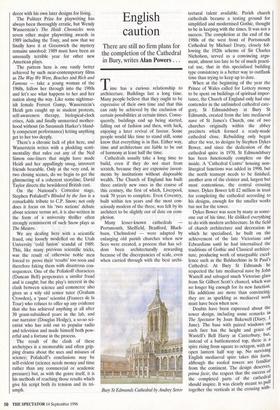Theatre
The Tailor-Made Man (Cockpit) The Heidi Chronicles (Greenwich) Blinded by the Sun (National Theatre)
Design for living
Sheridan Morley
One of the most intriguing tales from Hollywood Babylon, the underworld of movie-star sexuality through the century, has always been that of William Haines, the silent-screen star of a dozen Twenties hits who successfully survived even the coming of the talkies. Then, however, he was caught in bed with a sailor in a down- town Los Angeles YMCA, whereupon all studios blacklisted him and even destroyed prints of his films.
Undeterred, Haines became Hollywood's first star interior decorator, transferring what he had learnt on movie sets of carpets and curtains to the homes of the stars who succeeded him; this second career lasted 30 years and was crowned in 1960 by the invi- tation to decorate the American Ambas- sador's home in Regent's Park, where some of his work can still be seen. He died in 1973 aged 73; precisely a year later his lover of 50 California summers, Jimmy Shields, committed suicide on the grounds that life without Bill was no life at all.
It's a good story, not only for what it tells of the birth of the interior-decorating trade in America but also for its awful Holly- wood warning to gays. Had Haines not been blacklisted, stars from Cary Grant through James Dean and Montgomery Clift to Rock Hudson might have been able to lead sexual lives of less terror and secre- cy and suppression and confusion.
Unfortunately, The Tailor-Made Man, a play written and directed by Claudio Macor at the Cockpit in Marylebone, only goes skin-deep into the affair, offering ludicrous cameos of Louis B. Mayer and such Haines supporters and early clients as Carole Lom- bard and Marion Davies. Only when the script turns to simple historical narrative is there any real dramatic interest, though James Innes Smith (as Haines) and Adrian Sharp (as Shields) do have the right period looks; but the script never even manages to connect what Haines had seen of film-set
decor with his own later designs for living.
The Pulitzer Prize for playwriting has always been thoroughly erratic, but Wendy Wasserstein's The Heidi Chronicles won seven other major playwriting awards in 1989 including the Tony, and now that we finally have it at Greenwich the mystery remains unsolved: 1989 must have been an unusually terrible year for other new American plays.
The pattern here is one vastly better achieved by such near-contemporary films as The Way We Were, Beaches and Rich and Famous — take a young woman of the 1960s, follow her through into the 1980s and let's see what happens to her and her nation along the way. Like some nightmar- ish female Forrest Gump, Wasserstein's Heidi gets caught up in student protests, self-awareness therapy, biological-clock crises, Aids and finally unmarried mother. hood without (in Susannah Harker's bland- ly competent performance) letting anything get to her too deeply.
There's a chronic lack of plot here, and Wasserstein writes with a plodding senti- mentality that rules out any of the Neil Simon one-liners that might have made Heidi and her appallingly smug, introvert friends bearable. Only at the very end, in two closing scenes, do we begin to get the glimmering of a coherent storyline; David Taylor directs the bewildered British cast.
On the National's Cottesloe stage, Stephen Poliakoff's Blinded by the Sun is a remarkable tribute to C.P. Snow; not only does it focus on his 'two nations' debate about science versus art, it is also written in the form of a university thriller often strongly reminiscent of such Snow plays as The Masters.
We are dealing here with a scientific fraud, one loosely modelled on the Utah University `cold fusion' scandal of 1989. This, like many previous scientific tricks, was the result of otherwise noble men forced to prove their 'results' too soon and therefore faking them with disastrous con- sequences. One of the Poliakoff characters (Duncan Bell) perpetrates a similar fraud and is caught; but the play's interest in the clash between science and commerce also gives us a wily old senior tutor (Graham Crowden), a 'pure' scientist (Frances de la Tour) who refuses to offer up any evidence that she has achieved anything at all after 30 grant-subsidised years in the lab, and our narrator (Douglas Hodge), a so-so sci- entist who has sold out to popular radio and television and made himself both pow- erful and a fortune in the process.
The result of the clash of these archetypes is a memorable and often grip- ping drama about the uses and misuses of science; Poliakoff's conclusions may be self-evident (science needs money and time rather than any commercial or academic pressure) but, as with the genre itself, it is his methods of reaching those results which give his script both its tension and its tri- umph.



































































 Previous page
Previous page